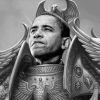- 17 Jun 2013 00:06
#14255713
I am of the opinion that fascism is in many ways a radical endpoint of capitalism. Recent revelations in the usa of almost Orwellian proportions have in my opinion put us quite close to the line between capitalism and fascism, if not a little over. Not like nazi Germany, but like all systems, there are varying levels of fascism. So a quick comparison:
fascism is in its most basic definition, rule by fear. Fear mongering and populism have been hallmarks of the US for centuries, all the way back to arguments against abolition. Check.
A signature characteristic of facism is a large semi-to-overtly repressive state, especially for minorities. As any inner city black man, lower class Latino, or distinctly Arab/Muslim person will tell you, this exists. And as mentioned above, the system is getting steadily more repressive. Check.
One last point, in fascism, the corporation becomes almost inseparable from the government, the government helps the business, business leaders support the government and direct it to some extent. This happened in Germany and Italy, and it is certainly happening in the US. Check.
There are more simularities, but these are the biggest. So the reason this is on this forum, is that having established a moderate fascist state in the us, what should the left do?
fascism is in its most basic definition, rule by fear. Fear mongering and populism have been hallmarks of the US for centuries, all the way back to arguments against abolition. Check.
A signature characteristic of facism is a large semi-to-overtly repressive state, especially for minorities. As any inner city black man, lower class Latino, or distinctly Arab/Muslim person will tell you, this exists. And as mentioned above, the system is getting steadily more repressive. Check.
One last point, in fascism, the corporation becomes almost inseparable from the government, the government helps the business, business leaders support the government and direct it to some extent. This happened in Germany and Italy, and it is certainly happening in the US. Check.
There are more simularities, but these are the biggest. So the reason this is on this forum, is that having established a moderate fascist state in the us, what should the left do?





























 - By JohnRawls
- By JohnRawls - By Potemkin
- By Potemkin